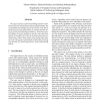Free Online Productivity Tools
i2Speak
i2Symbol
i2OCR
iTex2Img
iWeb2Print
iWeb2Shot
i2Type
iPdf2Split
iPdf2Merge
i2Bopomofo
i2Arabic
i2Style
i2Image
i2PDF
iLatex2Rtf
Sci2ools
120
click to vote
VLSID
2010
IEEE
2010
IEEE
Pinpointing Cache Timing Attacks on AES
The paper analyzes cache based timing attacks on optimized codes for Advanced Encryption Standard (AES). The work justifies that timing based cache attacks create hits in the first and second rounds of AES, in a manner that the timing variations leak information of the key. To the best of our knowledge, the paper justifies for the first time that these attacks are unable to force hits in the third round and concludes that a similar third round cache timing attack does not work. The paper experimentally verifies that protecting only the first two AES rounds thwarts cache based timing attacks.
Related Content
| Added | 31 Jan 2011 |
| Updated | 31 Jan 2011 |
| Type | Journal |
| Year | 2010 |
| Where | VLSID |
| Authors | Chester Rebeiro, Mainack Mondal, Debdeep Mukhopadhyay |
Comments (0)

